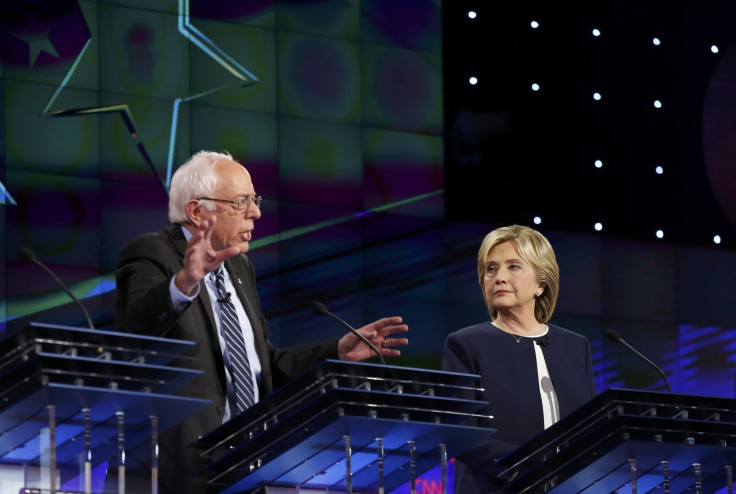Who Won The CNN Democratic Debate? Clinton, Sanders Praised For Performance

Soon after the five presidential hopefuls squared off Tuesday in the Democratic Party's first debate, the winners and losers emerged. Former U.S. Secretary of State Hillary Clinton and Vermont Sen. Bernie Sanders led the polls and had the most to lose, but pundits praised them for their consistency and confidence throughout the evening.
Sanders snagged the top spot based on his performance in Fox's online poll following the debate. He was followed by Clinton and former Virginia Sen. Jim Webb. Sanders also skyrocketed to first place in Slate's poll following the debate.
The Washington Post concluded Sanders won the debate, which was corroborated by the response online. "Sanders repeatedly saw spikes in Google interest after he spoke. After his intro. After he talked about guns. After basically everything else he said. About an hour after the debate began, Jim Webb attracted some attention after he complained about not having an opportunity to speak. But it was Sanders that drew attention the whole time. What's more, Sanders actually overpowered the long-term king of Google, Donald Trump. During the debate, Sanders continually attracted more Google interest than Trump," the paper wrote.
The Chicago Tribune also named the Vermont senator the night's winner. "Sanders is the reason Democrats have a serious primary race. And he came across Tuesday night as a candidate who believes what he believes and won't waffle. He voiced positions that will give some Democrats pause; he isn't a pacifist, he said, and as commander in chief wouldn't hesitate to take America to war," the Tribune wrote.
But some publications hailed Clinton as the winner. CNN applauded Clinton for her assertiveness. "In a performance aimed at solidifying her lock on the Democratic nomination, Clinton sought to pivot from a tough summer in which the controversy over her private email server triggered a slump in popularity ratings. She proved to be a polished debater, showing little rust after enduring 25 debates during the 2008 campaign," CNN wrote.
Other candidates received more lukewarm review. The Atlantic criticized former Maryland Gov. Martin O'Malley, former Rhode Island Gov. Lincoln Chafee and Webb:
The candidate who was commonly said to have the most to win or lose Tuesday was Martin O’Malley. It was hard to spot a breakout moment for him tonight, though he had several poised answers and managed to elicit big cheers from the audience. But he still struggled to break out -- in part because Sanders has stolen his thunder as the progressive standard bearer.
Jim Webb was the night’s wonkiest candidate, with each answer involving a mini-seminar on policy. But Webb seemed nervous and got irritated and not being more deeply involved—a problem exacerbated by his struggle to get the point in the time allotted to him. The less said about Lincoln Chafee, the better. The former Rhode Island governor and senator tried to undermine Clinton’s credibility, but delivered by far the worst answer of the night when he defended his vote to repeal the Glass-Steagall Act in 1999 by protesting that it was his first vote in the Senate, and he’d just taken his father’s seat. It was an answer in which he both failed to take responsibility for his own actions and also reminded viewers that he owes his political career to his father’s success.
The debate was broadcast by CNN Tuesday from the Wynn Hotel and Casino in Las Vegas.
© Copyright IBTimes 2025. All rights reserved.






















